The Role of Social Work in Mental Health Services: A Detailed Analysis
VerifiedAdded on 2022/08/23
|7
|1979
|19
Report
AI Summary
This report delves into the critical role of social work within mental health services. It begins by defining social work and its fundamental principles, emphasizing the profession's commitment to service, justice, and empowerment. The report explores the complexities social workers face in mental health, particularly in understanding and contributing to this field. It examines mental health social work within a social context, focusing on the social consequences of mental illness and the interventions social workers employ to address issues such as unawareness, vocational interests, and quality of life. The report highlights psychosocial interventions, using schizophrenia as a case study, and discusses the importance of cognitive remediation and medication. It also addresses the social consequences of mental illnesses like schizophrenia, including social exclusion, and the strategies used by social workers to improve the quality of life and social integration of affected individuals. The report concludes by emphasizing the significance of mental health literacy and the need for ongoing support in the community.
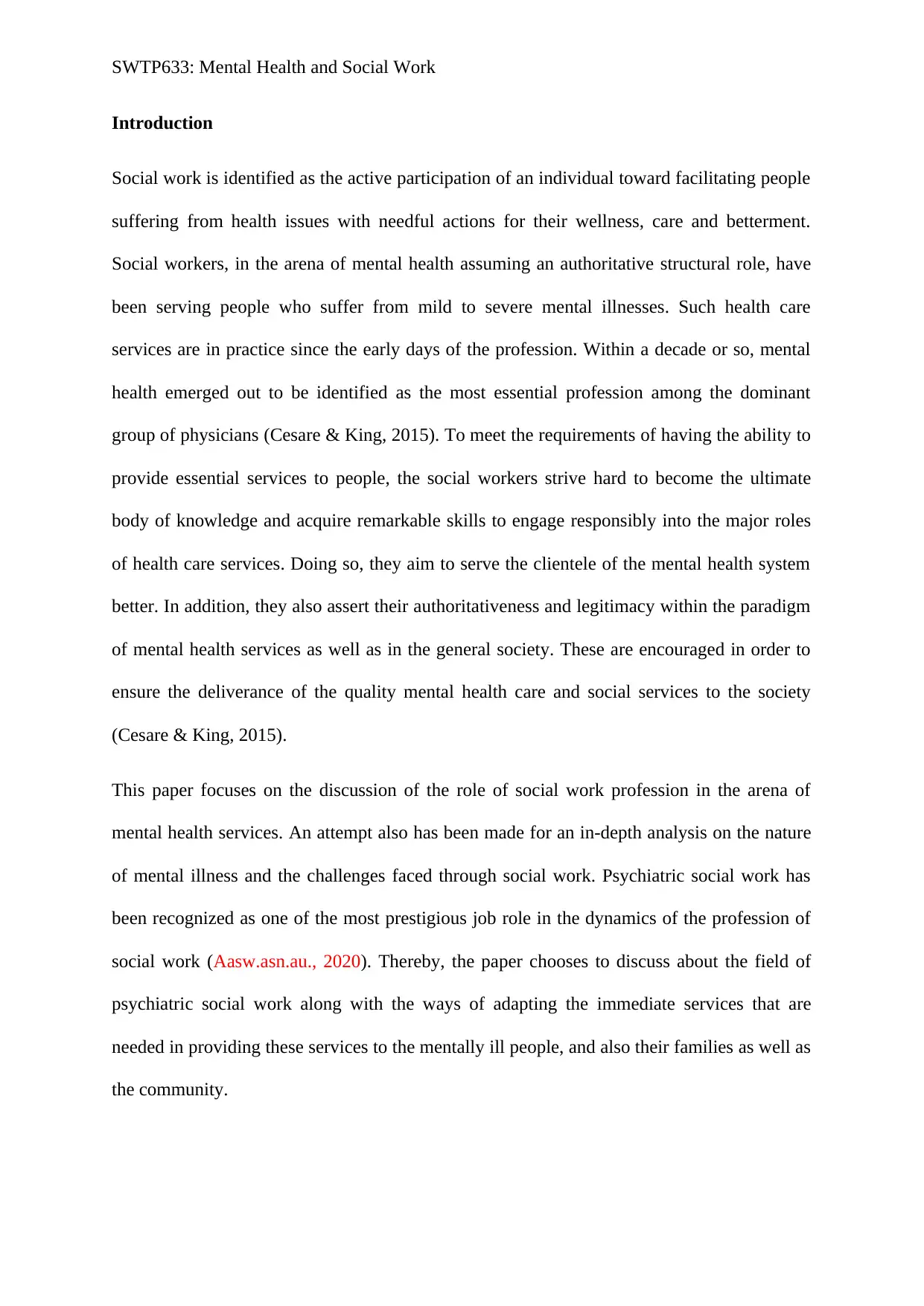
SWTP633: Mental Health and Social Work
Introduction
Social work is identified as the active participation of an individual toward facilitating people
suffering from health issues with needful actions for their wellness, care and betterment.
Social workers, in the arena of mental health assuming an authoritative structural role, have
been serving people who suffer from mild to severe mental illnesses. Such health care
services are in practice since the early days of the profession. Within a decade or so, mental
health emerged out to be identified as the most essential profession among the dominant
group of physicians (Cesare & King, 2015). To meet the requirements of having the ability to
provide essential services to people, the social workers strive hard to become the ultimate
body of knowledge and acquire remarkable skills to engage responsibly into the major roles
of health care services. Doing so, they aim to serve the clientele of the mental health system
better. In addition, they also assert their authoritativeness and legitimacy within the paradigm
of mental health services as well as in the general society. These are encouraged in order to
ensure the deliverance of the quality mental health care and social services to the society
(Cesare & King, 2015).
This paper focuses on the discussion of the role of social work profession in the arena of
mental health services. An attempt also has been made for an in-depth analysis on the nature
of mental illness and the challenges faced through social work. Psychiatric social work has
been recognized as one of the most prestigious job role in the dynamics of the profession of
social work (Aasw.asn.au., 2020). Thereby, the paper chooses to discuss about the field of
psychiatric social work along with the ways of adapting the immediate services that are
needed in providing these services to the mentally ill people, and also their families as well as
the community.
Introduction
Social work is identified as the active participation of an individual toward facilitating people
suffering from health issues with needful actions for their wellness, care and betterment.
Social workers, in the arena of mental health assuming an authoritative structural role, have
been serving people who suffer from mild to severe mental illnesses. Such health care
services are in practice since the early days of the profession. Within a decade or so, mental
health emerged out to be identified as the most essential profession among the dominant
group of physicians (Cesare & King, 2015). To meet the requirements of having the ability to
provide essential services to people, the social workers strive hard to become the ultimate
body of knowledge and acquire remarkable skills to engage responsibly into the major roles
of health care services. Doing so, they aim to serve the clientele of the mental health system
better. In addition, they also assert their authoritativeness and legitimacy within the paradigm
of mental health services as well as in the general society. These are encouraged in order to
ensure the deliverance of the quality mental health care and social services to the society
(Cesare & King, 2015).
This paper focuses on the discussion of the role of social work profession in the arena of
mental health services. An attempt also has been made for an in-depth analysis on the nature
of mental illness and the challenges faced through social work. Psychiatric social work has
been recognized as one of the most prestigious job role in the dynamics of the profession of
social work (Aasw.asn.au., 2020). Thereby, the paper chooses to discuss about the field of
psychiatric social work along with the ways of adapting the immediate services that are
needed in providing these services to the mentally ill people, and also their families as well as
the community.
Paraphrase This Document
Need a fresh take? Get an instant paraphrase of this document with our AI Paraphraser
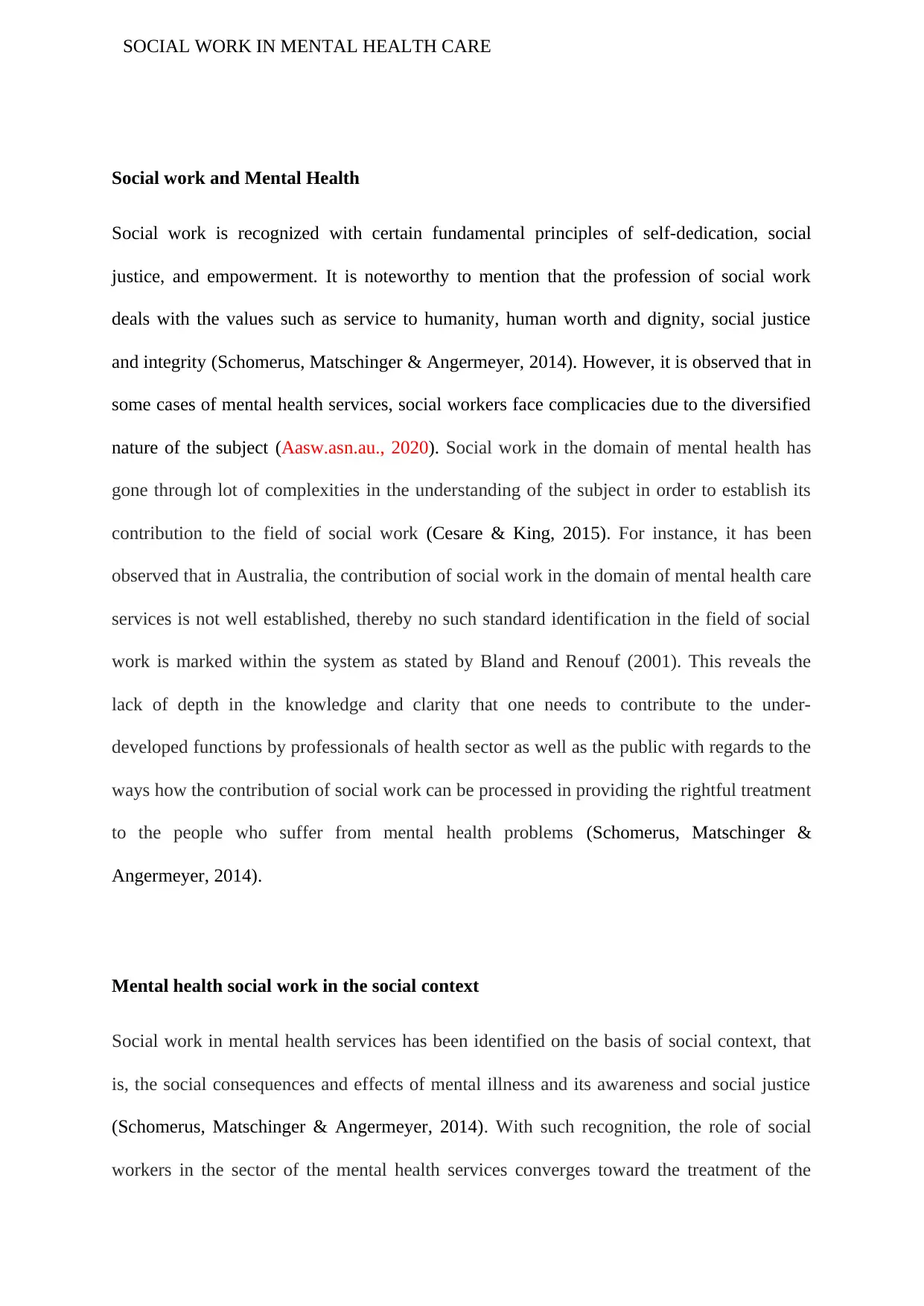
SOCIAL WORK IN MENTAL HEALTH CARE
Social work and Mental Health
Social work is recognized with certain fundamental principles of self-dedication, social
justice, and empowerment. It is noteworthy to mention that the profession of social work
deals with the values such as service to humanity, human worth and dignity, social justice
and integrity (Schomerus, Matschinger & Angermeyer, 2014). However, it is observed that in
some cases of mental health services, social workers face complicacies due to the diversified
nature of the subject (Aasw.asn.au., 2020). Social work in the domain of mental health has
gone through lot of complexities in the understanding of the subject in order to establish its
contribution to the field of social work (Cesare & King, 2015). For instance, it has been
observed that in Australia, the contribution of social work in the domain of mental health care
services is not well established, thereby no such standard identification in the field of social
work is marked within the system as stated by Bland and Renouf (2001). This reveals the
lack of depth in the knowledge and clarity that one needs to contribute to the under-
developed functions by professionals of health sector as well as the public with regards to the
ways how the contribution of social work can be processed in providing the rightful treatment
to the people who suffer from mental health problems (Schomerus, Matschinger &
Angermeyer, 2014).
Mental health social work in the social context
Social work in mental health services has been identified on the basis of social context, that
is, the social consequences and effects of mental illness and its awareness and social justice
(Schomerus, Matschinger & Angermeyer, 2014). With such recognition, the role of social
workers in the sector of the mental health services converges toward the treatment of the
Social work and Mental Health
Social work is recognized with certain fundamental principles of self-dedication, social
justice, and empowerment. It is noteworthy to mention that the profession of social work
deals with the values such as service to humanity, human worth and dignity, social justice
and integrity (Schomerus, Matschinger & Angermeyer, 2014). However, it is observed that in
some cases of mental health services, social workers face complicacies due to the diversified
nature of the subject (Aasw.asn.au., 2020). Social work in the domain of mental health has
gone through lot of complexities in the understanding of the subject in order to establish its
contribution to the field of social work (Cesare & King, 2015). For instance, it has been
observed that in Australia, the contribution of social work in the domain of mental health care
services is not well established, thereby no such standard identification in the field of social
work is marked within the system as stated by Bland and Renouf (2001). This reveals the
lack of depth in the knowledge and clarity that one needs to contribute to the under-
developed functions by professionals of health sector as well as the public with regards to the
ways how the contribution of social work can be processed in providing the rightful treatment
to the people who suffer from mental health problems (Schomerus, Matschinger &
Angermeyer, 2014).
Mental health social work in the social context
Social work in mental health services has been identified on the basis of social context, that
is, the social consequences and effects of mental illness and its awareness and social justice
(Schomerus, Matschinger & Angermeyer, 2014). With such recognition, the role of social
workers in the sector of the mental health services converges toward the treatment of the
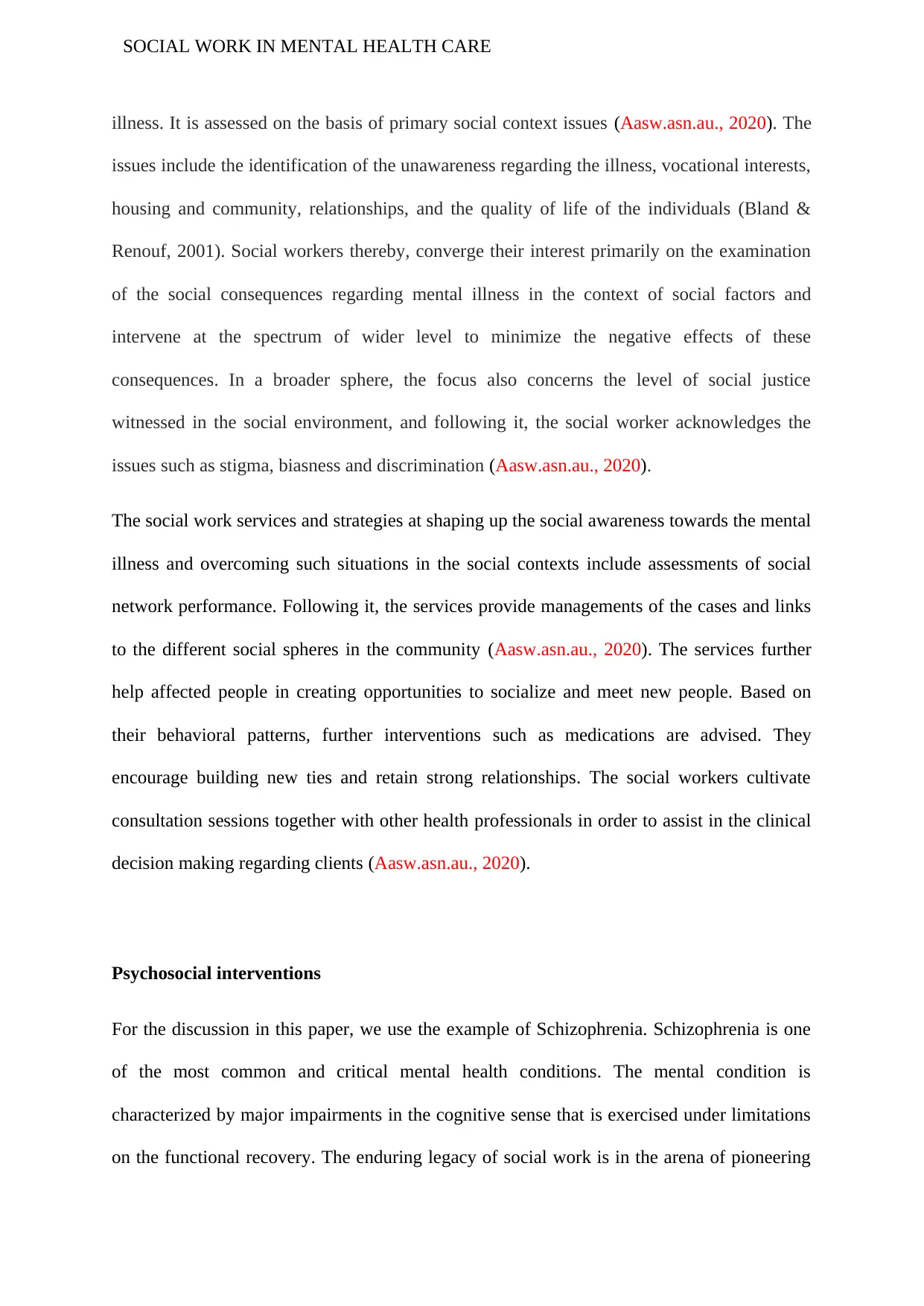
SOCIAL WORK IN MENTAL HEALTH CARE
illness. It is assessed on the basis of primary social context issues (Aasw.asn.au., 2020). The
issues include the identification of the unawareness regarding the illness, vocational interests,
housing and community, relationships, and the quality of life of the individuals (Bland &
Renouf, 2001). Social workers thereby, converge their interest primarily on the examination
of the social consequences regarding mental illness in the context of social factors and
intervene at the spectrum of wider level to minimize the negative effects of these
consequences. In a broader sphere, the focus also concerns the level of social justice
witnessed in the social environment, and following it, the social worker acknowledges the
issues such as stigma, biasness and discrimination (Aasw.asn.au., 2020).
The social work services and strategies at shaping up the social awareness towards the mental
illness and overcoming such situations in the social contexts include assessments of social
network performance. Following it, the services provide managements of the cases and links
to the different social spheres in the community (Aasw.asn.au., 2020). The services further
help affected people in creating opportunities to socialize and meet new people. Based on
their behavioral patterns, further interventions such as medications are advised. They
encourage building new ties and retain strong relationships. The social workers cultivate
consultation sessions together with other health professionals in order to assist in the clinical
decision making regarding clients (Aasw.asn.au., 2020).
Psychosocial interventions
For the discussion in this paper, we use the example of Schizophrenia. Schizophrenia is one
of the most common and critical mental health conditions. The mental condition is
characterized by major impairments in the cognitive sense that is exercised under limitations
on the functional recovery. The enduring legacy of social work is in the arena of pioneering
illness. It is assessed on the basis of primary social context issues (Aasw.asn.au., 2020). The
issues include the identification of the unawareness regarding the illness, vocational interests,
housing and community, relationships, and the quality of life of the individuals (Bland &
Renouf, 2001). Social workers thereby, converge their interest primarily on the examination
of the social consequences regarding mental illness in the context of social factors and
intervene at the spectrum of wider level to minimize the negative effects of these
consequences. In a broader sphere, the focus also concerns the level of social justice
witnessed in the social environment, and following it, the social worker acknowledges the
issues such as stigma, biasness and discrimination (Aasw.asn.au., 2020).
The social work services and strategies at shaping up the social awareness towards the mental
illness and overcoming such situations in the social contexts include assessments of social
network performance. Following it, the services provide managements of the cases and links
to the different social spheres in the community (Aasw.asn.au., 2020). The services further
help affected people in creating opportunities to socialize and meet new people. Based on
their behavioral patterns, further interventions such as medications are advised. They
encourage building new ties and retain strong relationships. The social workers cultivate
consultation sessions together with other health professionals in order to assist in the clinical
decision making regarding clients (Aasw.asn.au., 2020).
Psychosocial interventions
For the discussion in this paper, we use the example of Schizophrenia. Schizophrenia is one
of the most common and critical mental health conditions. The mental condition is
characterized by major impairments in the cognitive sense that is exercised under limitations
on the functional recovery. The enduring legacy of social work is in the arena of pioneering
⊘ This is a preview!⊘
Do you want full access?
Subscribe today to unlock all pages.

Trusted by 1+ million students worldwide
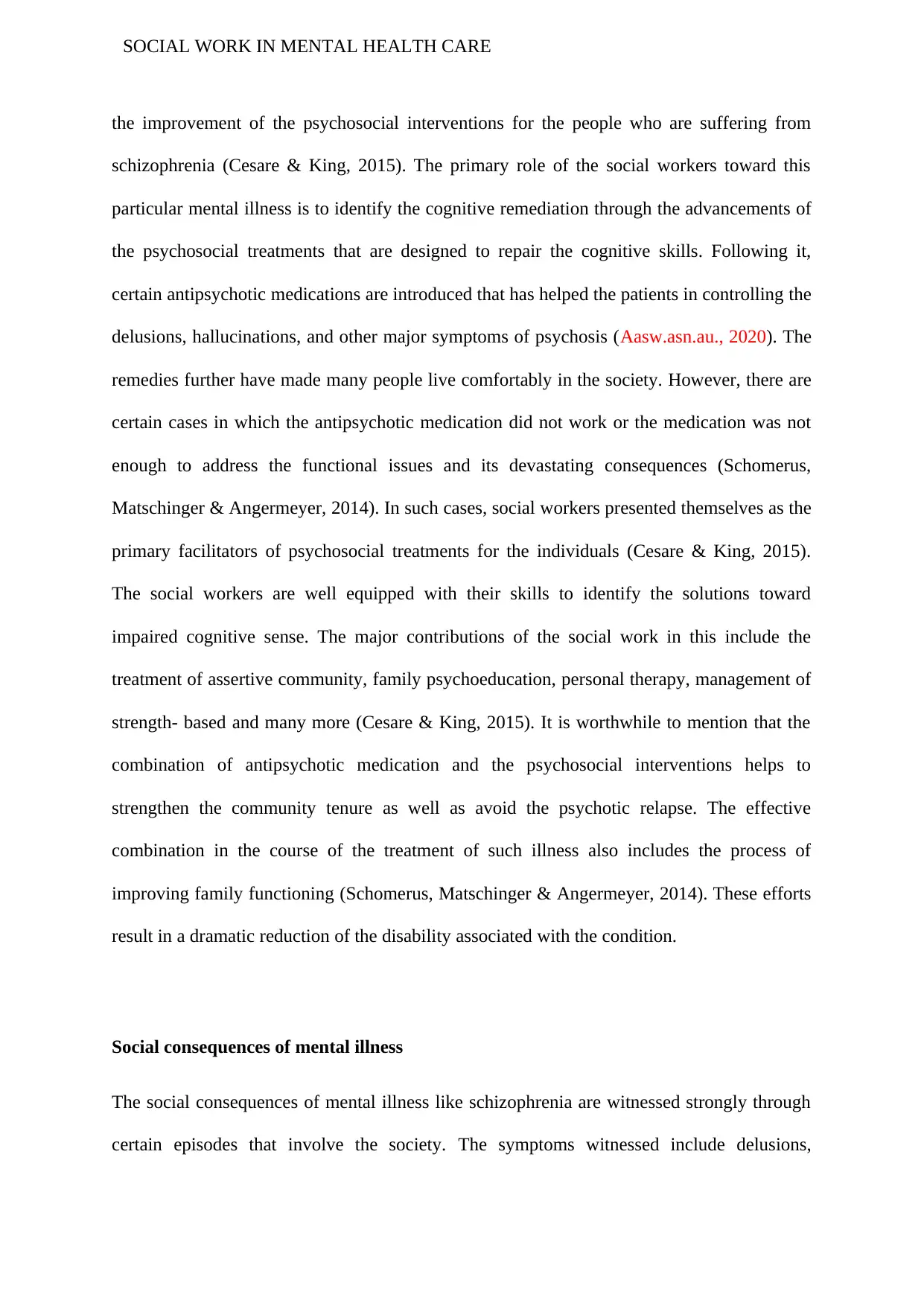
SOCIAL WORK IN MENTAL HEALTH CARE
the improvement of the psychosocial interventions for the people who are suffering from
schizophrenia (Cesare & King, 2015). The primary role of the social workers toward this
particular mental illness is to identify the cognitive remediation through the advancements of
the psychosocial treatments that are designed to repair the cognitive skills. Following it,
certain antipsychotic medications are introduced that has helped the patients in controlling the
delusions, hallucinations, and other major symptoms of psychosis (Aasw.asn.au., 2020). The
remedies further have made many people live comfortably in the society. However, there are
certain cases in which the antipsychotic medication did not work or the medication was not
enough to address the functional issues and its devastating consequences (Schomerus,
Matschinger & Angermeyer, 2014). In such cases, social workers presented themselves as the
primary facilitators of psychosocial treatments for the individuals (Cesare & King, 2015).
The social workers are well equipped with their skills to identify the solutions toward
impaired cognitive sense. The major contributions of the social work in this include the
treatment of assertive community, family psychoeducation, personal therapy, management of
strength- based and many more (Cesare & King, 2015). It is worthwhile to mention that the
combination of antipsychotic medication and the psychosocial interventions helps to
strengthen the community tenure as well as avoid the psychotic relapse. The effective
combination in the course of the treatment of such illness also includes the process of
improving family functioning (Schomerus, Matschinger & Angermeyer, 2014). These efforts
result in a dramatic reduction of the disability associated with the condition.
Social consequences of mental illness
The social consequences of mental illness like schizophrenia are witnessed strongly through
certain episodes that involve the society. The symptoms witnessed include delusions,
the improvement of the psychosocial interventions for the people who are suffering from
schizophrenia (Cesare & King, 2015). The primary role of the social workers toward this
particular mental illness is to identify the cognitive remediation through the advancements of
the psychosocial treatments that are designed to repair the cognitive skills. Following it,
certain antipsychotic medications are introduced that has helped the patients in controlling the
delusions, hallucinations, and other major symptoms of psychosis (Aasw.asn.au., 2020). The
remedies further have made many people live comfortably in the society. However, there are
certain cases in which the antipsychotic medication did not work or the medication was not
enough to address the functional issues and its devastating consequences (Schomerus,
Matschinger & Angermeyer, 2014). In such cases, social workers presented themselves as the
primary facilitators of psychosocial treatments for the individuals (Cesare & King, 2015).
The social workers are well equipped with their skills to identify the solutions toward
impaired cognitive sense. The major contributions of the social work in this include the
treatment of assertive community, family psychoeducation, personal therapy, management of
strength- based and many more (Cesare & King, 2015). It is worthwhile to mention that the
combination of antipsychotic medication and the psychosocial interventions helps to
strengthen the community tenure as well as avoid the psychotic relapse. The effective
combination in the course of the treatment of such illness also includes the process of
improving family functioning (Schomerus, Matschinger & Angermeyer, 2014). These efforts
result in a dramatic reduction of the disability associated with the condition.
Social consequences of mental illness
The social consequences of mental illness like schizophrenia are witnessed strongly through
certain episodes that involve the society. The symptoms witnessed include delusions,
Paraphrase This Document
Need a fresh take? Get an instant paraphrase of this document with our AI Paraphraser
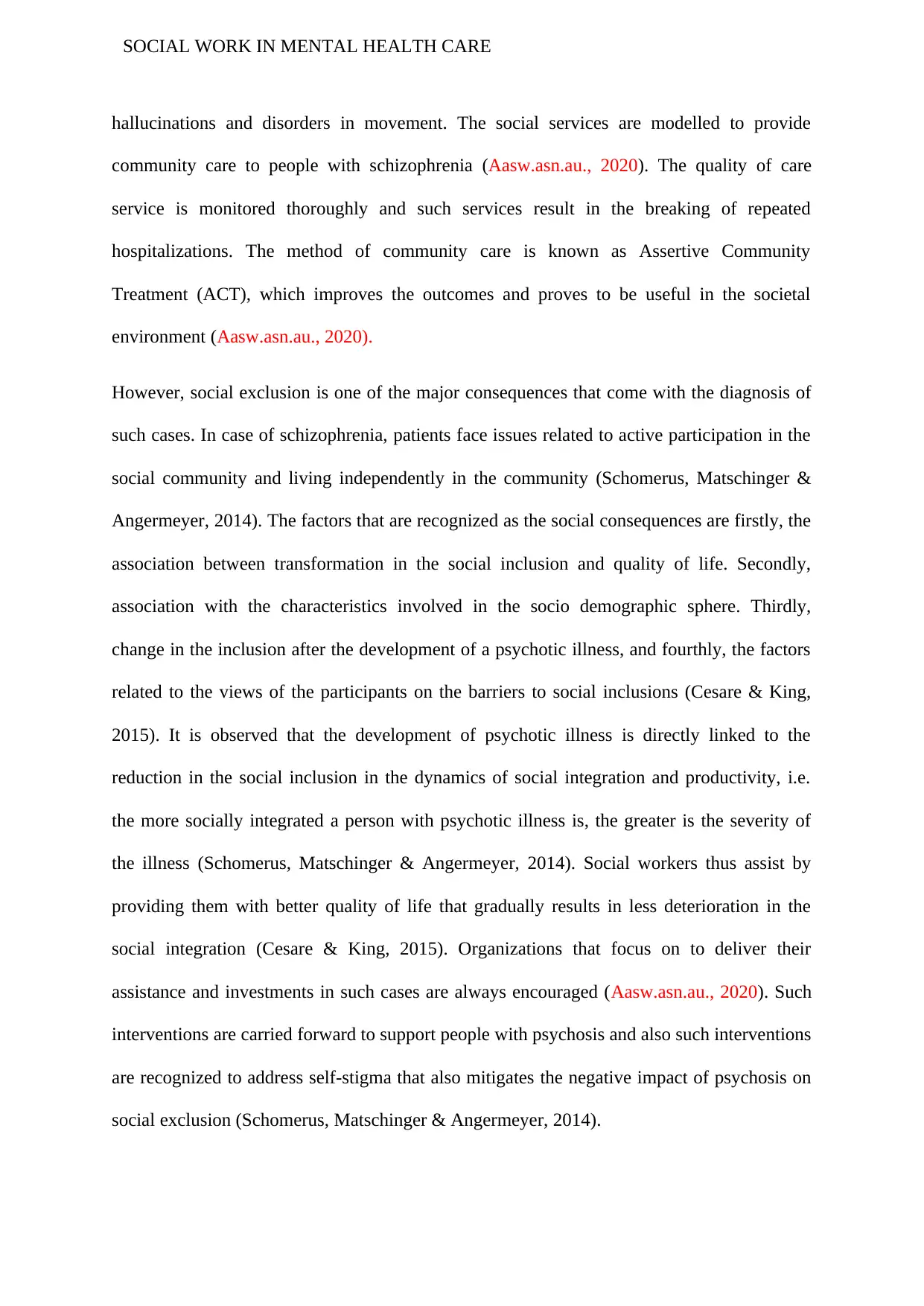
SOCIAL WORK IN MENTAL HEALTH CARE
hallucinations and disorders in movement. The social services are modelled to provide
community care to people with schizophrenia (Aasw.asn.au., 2020). The quality of care
service is monitored thoroughly and such services result in the breaking of repeated
hospitalizations. The method of community care is known as Assertive Community
Treatment (ACT), which improves the outcomes and proves to be useful in the societal
environment (Aasw.asn.au., 2020).
However, social exclusion is one of the major consequences that come with the diagnosis of
such cases. In case of schizophrenia, patients face issues related to active participation in the
social community and living independently in the community (Schomerus, Matschinger &
Angermeyer, 2014). The factors that are recognized as the social consequences are firstly, the
association between transformation in the social inclusion and quality of life. Secondly,
association with the characteristics involved in the socio demographic sphere. Thirdly,
change in the inclusion after the development of a psychotic illness, and fourthly, the factors
related to the views of the participants on the barriers to social inclusions (Cesare & King,
2015). It is observed that the development of psychotic illness is directly linked to the
reduction in the social inclusion in the dynamics of social integration and productivity, i.e.
the more socially integrated a person with psychotic illness is, the greater is the severity of
the illness (Schomerus, Matschinger & Angermeyer, 2014). Social workers thus assist by
providing them with better quality of life that gradually results in less deterioration in the
social integration (Cesare & King, 2015). Organizations that focus on to deliver their
assistance and investments in such cases are always encouraged (Aasw.asn.au., 2020). Such
interventions are carried forward to support people with psychosis and also such interventions
are recognized to address self-stigma that also mitigates the negative impact of psychosis on
social exclusion (Schomerus, Matschinger & Angermeyer, 2014).
hallucinations and disorders in movement. The social services are modelled to provide
community care to people with schizophrenia (Aasw.asn.au., 2020). The quality of care
service is monitored thoroughly and such services result in the breaking of repeated
hospitalizations. The method of community care is known as Assertive Community
Treatment (ACT), which improves the outcomes and proves to be useful in the societal
environment (Aasw.asn.au., 2020).
However, social exclusion is one of the major consequences that come with the diagnosis of
such cases. In case of schizophrenia, patients face issues related to active participation in the
social community and living independently in the community (Schomerus, Matschinger &
Angermeyer, 2014). The factors that are recognized as the social consequences are firstly, the
association between transformation in the social inclusion and quality of life. Secondly,
association with the characteristics involved in the socio demographic sphere. Thirdly,
change in the inclusion after the development of a psychotic illness, and fourthly, the factors
related to the views of the participants on the barriers to social inclusions (Cesare & King,
2015). It is observed that the development of psychotic illness is directly linked to the
reduction in the social inclusion in the dynamics of social integration and productivity, i.e.
the more socially integrated a person with psychotic illness is, the greater is the severity of
the illness (Schomerus, Matschinger & Angermeyer, 2014). Social workers thus assist by
providing them with better quality of life that gradually results in less deterioration in the
social integration (Cesare & King, 2015). Organizations that focus on to deliver their
assistance and investments in such cases are always encouraged (Aasw.asn.au., 2020). Such
interventions are carried forward to support people with psychosis and also such interventions
are recognized to address self-stigma that also mitigates the negative impact of psychosis on
social exclusion (Schomerus, Matschinger & Angermeyer, 2014).
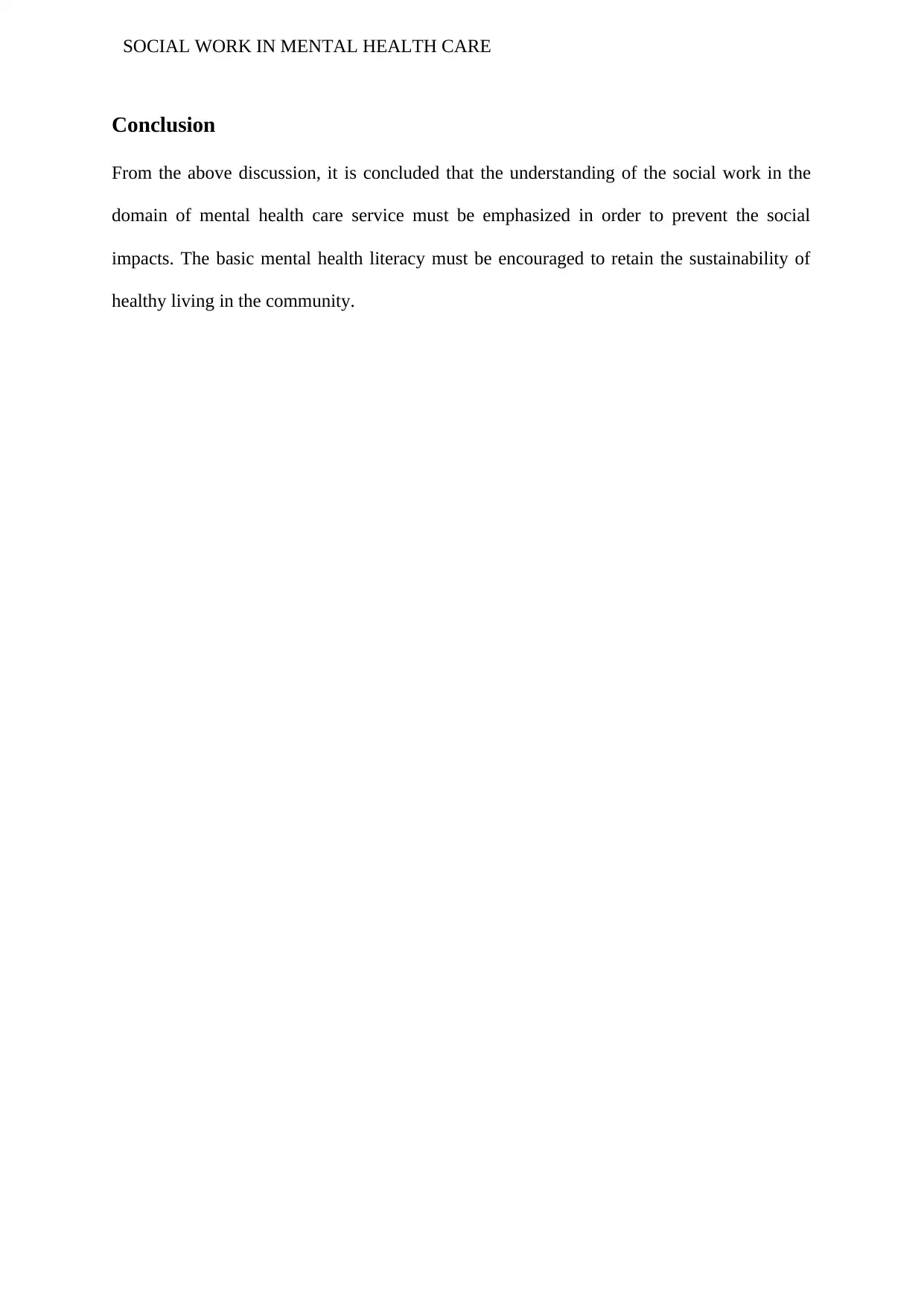
SOCIAL WORK IN MENTAL HEALTH CARE
Conclusion
From the above discussion, it is concluded that the understanding of the social work in the
domain of mental health care service must be emphasized in order to prevent the social
impacts. The basic mental health literacy must be encouraged to retain the sustainability of
healthy living in the community.
Conclusion
From the above discussion, it is concluded that the understanding of the social work in the
domain of mental health care service must be emphasized in order to prevent the social
impacts. The basic mental health literacy must be encouraged to retain the sustainability of
healthy living in the community.
⊘ This is a preview!⊘
Do you want full access?
Subscribe today to unlock all pages.

Trusted by 1+ million students worldwide
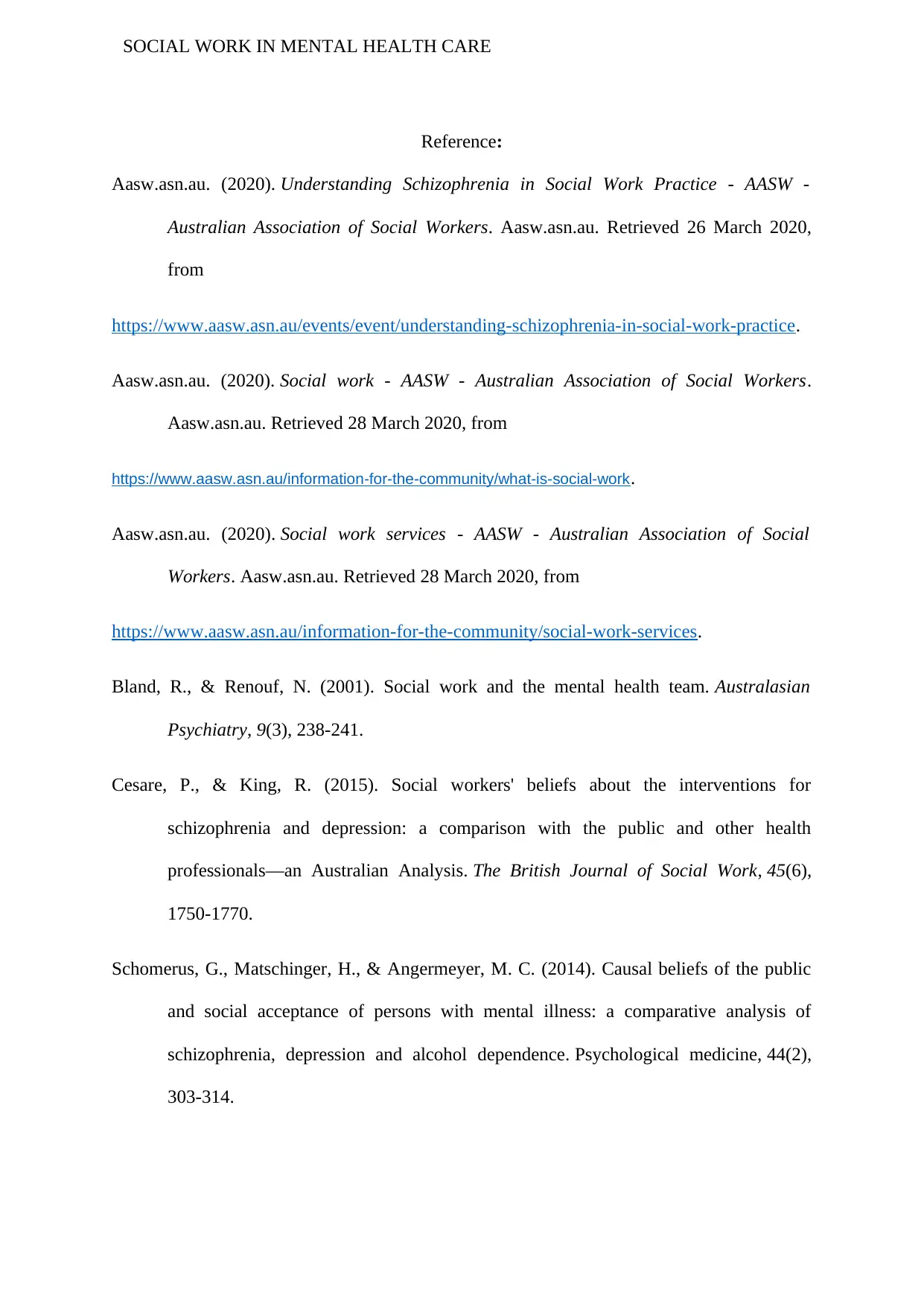
SOCIAL WORK IN MENTAL HEALTH CARE
Reference:
Aasw.asn.au. (2020). Understanding Schizophrenia in Social Work Practice - AASW -
Australian Association of Social Workers. Aasw.asn.au. Retrieved 26 March 2020,
from
https://www.aasw.asn.au/events/event/understanding-schizophrenia-in-social-work-practice.
Aasw.asn.au. (2020). Social work - AASW - Australian Association of Social Workers.
Aasw.asn.au. Retrieved 28 March 2020, from
https://www.aasw.asn.au/information-for-the-community/what-is-social-work.
Aasw.asn.au. (2020). Social work services - AASW - Australian Association of Social
Workers. Aasw.asn.au. Retrieved 28 March 2020, from
https://www.aasw.asn.au/information-for-the-community/social-work-services.
Bland, R., & Renouf, N. (2001). Social work and the mental health team. Australasian
Psychiatry, 9(3), 238-241.
Cesare, P., & King, R. (2015). Social workers' beliefs about the interventions for
schizophrenia and depression: a comparison with the public and other health
professionals—an Australian Analysis. The British Journal of Social Work, 45(6),
1750-1770.
Schomerus, G., Matschinger, H., & Angermeyer, M. C. (2014). Causal beliefs of the public
and social acceptance of persons with mental illness: a comparative analysis of
schizophrenia, depression and alcohol dependence. Psychological medicine, 44(2),
303-314.
Reference:
Aasw.asn.au. (2020). Understanding Schizophrenia in Social Work Practice - AASW -
Australian Association of Social Workers. Aasw.asn.au. Retrieved 26 March 2020,
from
https://www.aasw.asn.au/events/event/understanding-schizophrenia-in-social-work-practice.
Aasw.asn.au. (2020). Social work - AASW - Australian Association of Social Workers.
Aasw.asn.au. Retrieved 28 March 2020, from
https://www.aasw.asn.au/information-for-the-community/what-is-social-work.
Aasw.asn.au. (2020). Social work services - AASW - Australian Association of Social
Workers. Aasw.asn.au. Retrieved 28 March 2020, from
https://www.aasw.asn.au/information-for-the-community/social-work-services.
Bland, R., & Renouf, N. (2001). Social work and the mental health team. Australasian
Psychiatry, 9(3), 238-241.
Cesare, P., & King, R. (2015). Social workers' beliefs about the interventions for
schizophrenia and depression: a comparison with the public and other health
professionals—an Australian Analysis. The British Journal of Social Work, 45(6),
1750-1770.
Schomerus, G., Matschinger, H., & Angermeyer, M. C. (2014). Causal beliefs of the public
and social acceptance of persons with mental illness: a comparative analysis of
schizophrenia, depression and alcohol dependence. Psychological medicine, 44(2),
303-314.
1 out of 7
Related Documents
Your All-in-One AI-Powered Toolkit for Academic Success.
+13062052269
info@desklib.com
Available 24*7 on WhatsApp / Email
![[object Object]](/_next/static/media/star-bottom.7253800d.svg)
Unlock your academic potential
Copyright © 2020–2025 A2Z Services. All Rights Reserved. Developed and managed by ZUCOL.





